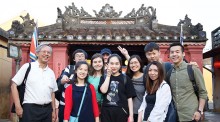Adrienne harry
Its studious name notwithstanding, Reading Week is seen by many students as a time to leave their books behind and unwind before exam season rushes in. But several students from the Munk School of Global Affairs used the week off from classes to delve further into their studies.
Nearly 40 Munk School students traveled to Japan, Georgia or Vietnam during Reading Week to study everything from urban development to energy legislation.
“Being able to travel to Georgia and conduct interviews with people actually involved in the government provided me with a perspective on my research that I would not have otherwise gained,” says Courtney Hallink, a third-year international relations major studying Georgia’s transition into a market economy. “It’s the best experience I’ve had so far in my university career.”
The trips to Georgia and Vietnam were made possible by the International Course Module (ICM), a program funded by the Faculty of Arts and Science. ICMs give faculty like Hallink’s professor, Robert Austin, an opportunity to incorporate an international experience into the framework of an existing class, and give students a chance to conduct primary research, an opportunity not usually afforded undergrads. Through his course “Enlarging Europe — the European Union and its applicants”, Austin has sent 10 groups of students to Europe — seven groups to Kosovo and three groups to Georgia.
“Once you see and hear things in-person, it becomes much easier and more rewarding to tie them in with things learned in class,” says Raja Abdo , a fifth-year ethics, society and law student who is studying the challenges and successes of Georgia’s wine industry.
Fourth-year contemporary Asian studies student Xin Zhang agrees that face-to-face interaction makes all the difference in research.
“Good research really depends on the people you’re working with,” says Zhang, who spent Reading Week studying urban development in Ho Chi Minh City and Da Nang, Vietnam, for her program’s capstone seminar, “Critical Perspectives on Asian Modernity.” “I had access to local students, city officials and residents, who all helped me better understand Vietnam’s distinct policies on urban planning. Our student interpreter did lots of extra research for us even after our stay in Vietnam.”
In Japan, 19 U of T students participated in the KAKEHASHI Project, an international initiative sponsored by the Government of Japan. The program is aimed at fostering face-to-face exchange between the Japanese and the rest of the world. A total of 130 Canadian students were invited and attended lectures on Japanese politics, society, history and diplomatic relations. Homestays and storytelling sessions gave students a rich opportunity to hear firsthand accounts of some of the most impactful moments in recent history, like the devastating effects of 2011’s Tōhoku earthquake and tsunami.
“I met a woman who told us about a small village that was very substantially impacted by the tsunami. Almost every building was washed away and many deaths occurred in the exact spot we were standing,” says Amy Bronson a first-year master of global affairs candidate. “The impact of her story brought learning about post-tsunami reconstruction to life in a way that is much more human than studying government policy and economic impact.”
Although there wasn’t much reading to be done during Reading Week, most students agreed that their time away enhanced their learning better than any textbook.
“To go on this whirlwind adventure for a week was life-changing,” says Bronson of her experience in Japan. “It gave me a very enhanced appreciation for what I’m studying. Going abroad to learn in an immersive way is really the best way.”
Check out photos from the students’ travels in the gallery below:
March 1, 2016
